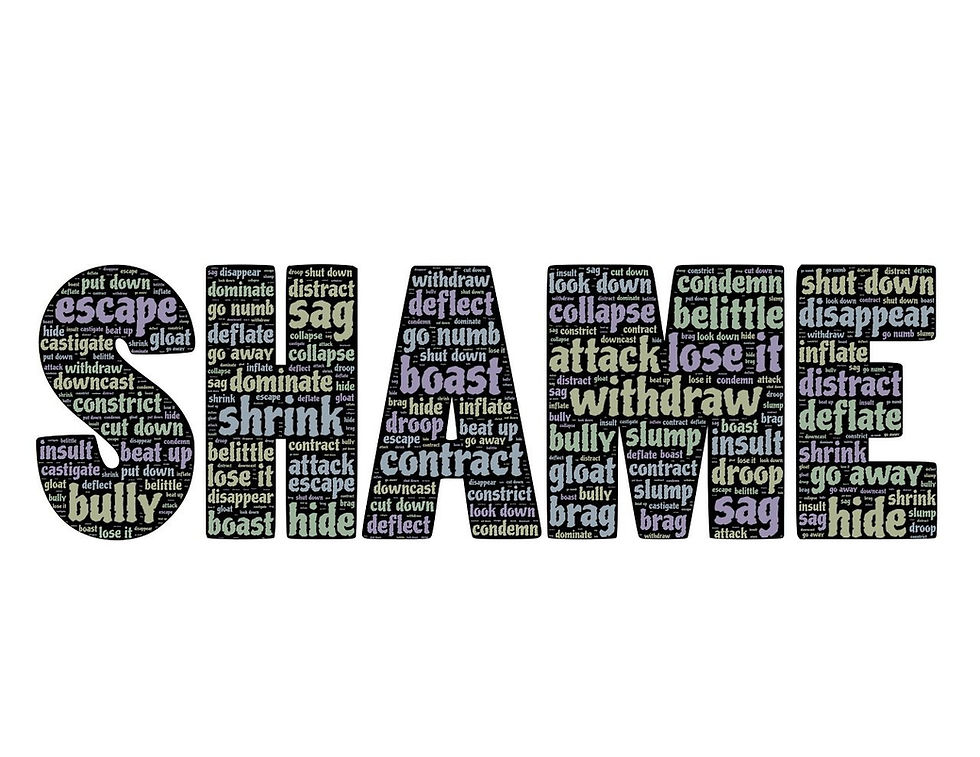Dropping Below the Surface: Exploring Vulnerable Emotions Beneath Anxiety
- Dr. Michael Gamble

- May 28, 2025
- 4 min read
Updated: May 31, 2025

Hi there! Danaé here, a Marriage and Family Therapist Intern at Fire and Love Wellness. In my work, I hear so many people share how exhausting and all-consuming anxiety can feel. It’s like a constant background noise—buzzing in your mind and in your heart.
And I get it. I’ve experienced anxiety myself, and I know it’s more than just, “worrying too much.” It can feel like your whole body is on high alert—like your mind is racing a mile a minute, trying to figure out what’s wrong or what your next step should be. It can be the pure overwhelming nature of task overload! It can be hard to sleep, hard to focus, and hard to feel fully present in your own life.
But here’s something I’ve come to learn: anxiety is rarely the full story. It’s like the tip of the iceberg. Beneath it, there are often deeper, more vulnerable emotions quietly calling out for care.
I want to share five common feelings that often lie beneath anxiety. Maybe you’ll see a piece of your own experience in them. My hope is that these words help you feel less alone—and a little more understood.
Anxiety & the Fear of Rejection
“What if they don’t really want me?”

This fear can be subtle or loud. It can make us question whether we belong, whether people really like us, or whether we’re somehow too much or not enough. It can lead to second-guessing our words or actions in conversations, or constantly replaying interactions in our minds, looking for signs that someone might be pulling away. Underneath, there’s a deep longing for connection and acceptance—for reassurance that we’re wanted and valued just as we are. Naming this place can be the first step to softening the sharp edges of anxiety.
Shame
“Something about me isn’t enough.”

Shame can be a heavy, quiet burden. It can show up as a critical inner voice—telling us we’re not smart enough, attractive enough, successful enough. We might feel like we’re flawed at the core, and that if others really saw us, knew us, knew our history, they’d turn away. When we’re carrying shame, anxiety can rush in to try to protect us—like an overactive guard dog on high alert. It’s there to keep us from ever making a “mistake” or being found out. But in reality, this anxiety often keeps us stuck, reinforcing the belief that we have to be perfect to be loved.
Grief and Sadness
“I’ve lost something important to me.”

Grief isn’t just about death. It can be about losing a sense of safety, a dream, a relationship, or even a part of who we thought we were. Sometimes grief is hidden underneath anxiety because it feels too heavy to touch directly. When we haven’t had a chance to feel our grief, anxiety can move in to fill that void. It can keep us busy, distracted, or focused on controlling our environment—anything to avoid the ache of what we’ve lost. Allowing ourselves to gently acknowledge the sadness beneath can be deeply healing.
Loneliness
“I feel disconnected and unseen.”

Loneliness isn’t just about being alone; it’s about feeling unseen and not fully known by others. It’s a quiet ache that can live in the background, even when we’re surrounded by people. Anxiety often grows louder in moments of disconnection. It can push us to over-function—filling our time with tasks and to-dos so we don’t have to feel the emptiness. Underneath, though, is a deep human need to feel connected. When we slow down and make space for this feeling, it can guide us back to relationships that truly nourish us.
Fear of Losing Control
“If I’m not on top of everything, something bad will happen.”

This fear often grows from experiences where we felt things slipping out of our hands—times when life felt unpredictable or unsafe. Anxiety becomes a way of staying alert, scanning for potential threats, and trying to keep everything in order. This can look like perfectionism, hyper-vigilance, or an endless mental checklist where fear of drowning in the overwhelm only invites more fear. Sometimes it's the thought that if we don't do it, nobody will. It’s exhausting—like living with a motor that never turns off. But underneath, there’s usually a delicate hope for safety, stability, and someone to come alongside us. Recognizing this can help us find more gentle ways to meet that need—ways that don’t demand constant self-surveillance and burnout.
A Compassionate Path Forward
If any of these emotions resonate with you, I hope you’ll take a moment to pause and offer yourself some kindness. These feelings don’t mean something is wrong with you—they’re a part of being human, and often are brought on by external sources.
When we name what’s really beneath our anxiety, it can bring relief. It can help us move from feeling stuck and alone to feeling more connected to ourselves and to the people who matter to us.
If you're still feeling stuck identifying these underlying emotions on your own, we can certainly help guide you! My specialty is getting to those deeper emotions, seeking out root causes, and bringing them to the surface to process and explore! Alongside our therapy services, Dr. Michael Gamble provides a gamut of Holistic relaxation methods to reduce the stress caused by anxiety. Reach out, and we'll be so glad to work through this side-by-side with you.
With heartfelt care,

Danaé Behr, MFT-T



Comments